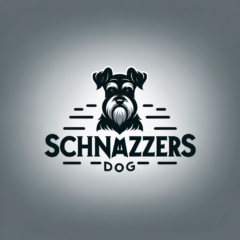The miniature Schnauzer, with its charming wiry coat, playful personality, and loyal nature, is a beloved breed throughout the world. As a devoted pet owner, it’s your responsibility to provide your furry friend with the best care possible, and that includes a well-balanced and nutritious diet. In this comprehensive guide, we will delve into the intricate world of miniature schnauzer nutrition, covering everything from the basics of a healthy diet to specific food recommendations and common dietary issues. So, let’s get started on keeping your little buddy happy and healthy!
Essential Nutrients for a Healthy Miniature Schnauzer
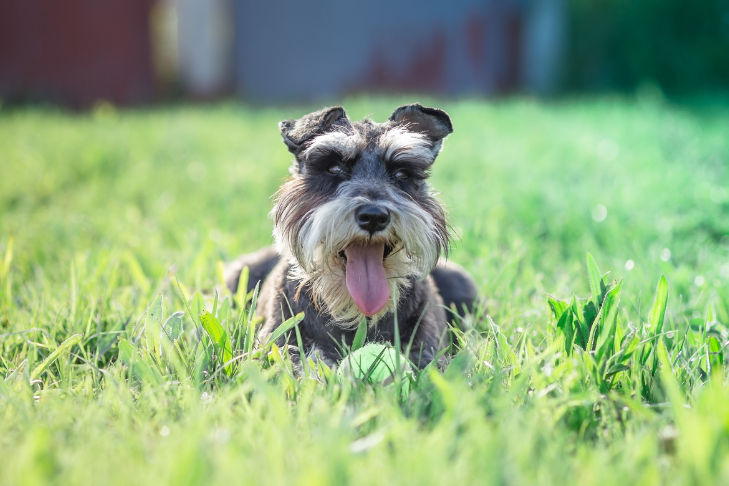
When it comes to your miniature schnauzer’s nutritional needs, there are some essential nutrients that should be included in their diet. These include protein, fat, carbohydrates, and fiber.
Protein
Protein is essential for muscle growth, repair, and overall health. Miniature schnauzers are an active breed, so it’s crucial to ensure that they are getting enough protein in their diet. High-quality sources of protein include lean meat, poultry, fish, and eggs. Make sure to choose lean options to avoid excess fat intake, which can lead to weight gain.
Fat
Fat is an important source of energy for dogs and also helps support healthy skin and coat. It’s also necessary for the absorption of fat-soluble vitamins. When choosing fats for your miniature schnauzer’s diet, opt for healthy options like fish oil, flaxseed oil, and omega-3 fatty acids. These are beneficial for your dog’s overall health and well-being.
Carbohydrates
Carbohydrates provide readily available energy for activity. They also play a significant role in maintaining blood sugar levels. However, it’s essential to choose complex carbohydrates like brown rice, quinoa, and sweet potatoes over simple ones like white rice or bread. Complex carbohydrates provide more nutrients and fiber, helping your miniature schnauzer feel fuller for longer.
Fiber
Fiber is often overlooked in a dog’s diet, but it plays a crucial role in promoting digestive health. It can also help maintain a healthy weight by making your dog feel full without consuming excess calories. Vegetables and fruits are excellent sources of fiber and should be included in your miniature schnauzer’s diet.
Feeding Your Miniature Schnauzer Puppy: A Growth Stage Diet

Just like with any other breed, puppies have different nutritional needs than adult dogs. During the first year of your miniature schnauzer’s life, they will go through a rapid growth phase that requires a specific diet to support healthy development.
Calories
Puppies need more calories than adult dogs to fuel their growth and active nature. On average, a miniature schnauzer puppy will need between 400-600 calories per day, depending on their age, size, and activity level. It’s essential to monitor your puppy’s weight and adjust their food intake accordingly to avoid overfeeding.
Protein and Fat
As mentioned before, protein and fat are crucial for muscle growth, energy, and overall health. However, during the growth stage, puppies require higher amounts of these nutrients than adult dogs. Look for high-quality puppy food that contains at least 25% protein and 15% fat.
Calcium and Phosphorus
Calcium and phosphorus are two minerals that play a critical role in bone development. Too little or too much of these minerals can lead to skeletal problems in growing puppies. The ideal ratio of calcium to phosphorus in a puppy’s diet is 1.2:1. Make sure to check the label or consult with your veterinarian to ensure your puppy’s food meets this requirement.
Essential Vitamins and Minerals
Puppies also need vitamins and minerals to support their immune system and overall health. Look for food that contains essential vitamins like A, D, E, and K, as well as minerals like iron, zinc, and copper.
Adult Miniature Schnauzer Diet: Maintaining Optimal Health
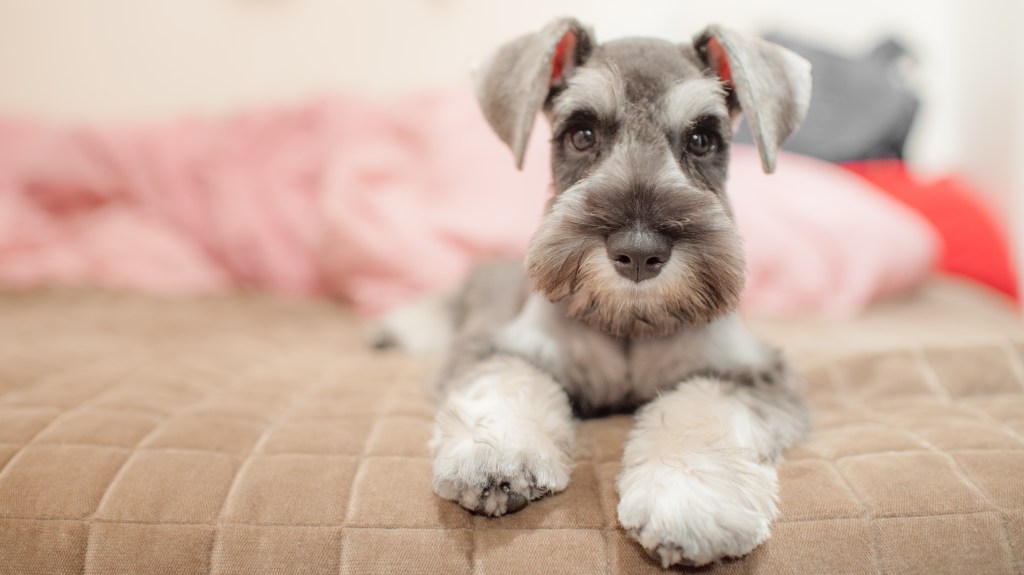
Once your miniature schnauzer reaches adulthood, their nutritional needs will change. They will require fewer calories and specific nutrients to maintain their health. Here are some dietary considerations for adult miniature schnauzers:
Calories
Adult miniature schnauzers typically need between 300-500 calories per day, depending on their activity level and size. It’s crucial to monitor their weight and adjust their food intake accordingly to prevent obesity.
Protein and Fat
While the required amounts of protein and fat remain similar to those during the growth stage, it’s essential to choose lean options to avoid excess fat intake. As dogs age, they become less active, making them more prone to weight gain. Choosing lean protein sources can help reduce the risk of obesity and other health issues.
Fiber
As your miniature schnauzer ages, their digestive system may slow down, leading to constipation or other digestive issues. Including fiber-rich foods in their diet can help promote regular bowel movements and maintain a healthy weight.
Essential Vitamins and Minerals
Vitamins and minerals continue to be essential for your adult miniature schnauzer’s health. Make sure to look for high-quality dog food that provides your dog with all the necessary nutrients. You can also consult with your veterinarian for any recommended supplements to support your dog’s specific needs.
Senior Miniature Schnauzer Diet: Addressing Age-Related Needs
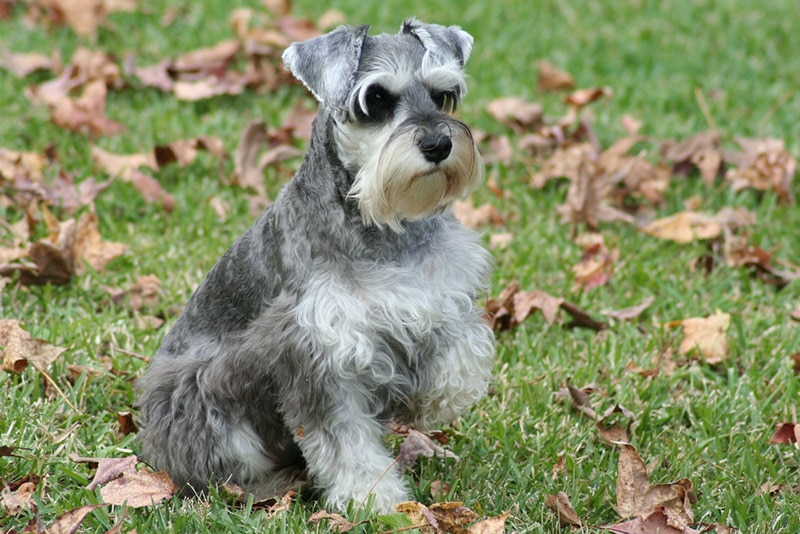
As your miniature schnauzer enters their senior years, they may start experiencing age-related health issues. These can include joint problems, digestion issues, and a decreased appetite. Here are some dietary considerations for senior miniature schnauzers:
Calories
Senior dogs have lower energy levels and require fewer calories than adults. However, it’s crucial to keep an eye on their weight and make adjustments accordingly. If your dog is less active, you may need to reduce their food intake to prevent weight gain.
Protein and Fat
While the recommended amounts of protein and fat remain similar to those for adult dogs, it’s essential to choose high-quality sources. As dogs age, they may develop kidney issues, making it vital to avoid excess protein in their diet. Choose lean protein sources and healthy fats to support your senior dog’s overall health.
Joint Health
As miniature schnauzers age, they may develop joint problems like arthritis, which can cause discomfort and mobility issues. Including supplements like glucosamine and chondroitin in their diet can help support joint health and alleviate any pain or stiffness.
Digestive Health
Senior dogs may also experience digestion issues, leading to a decreased appetite or difficulty maintaining a healthy weight. Including fiber-rich foods in their diet can help promote regular bowel movements and maintain a healthy weight.
Choosing the Right Food for Your Miniature Schnauzer
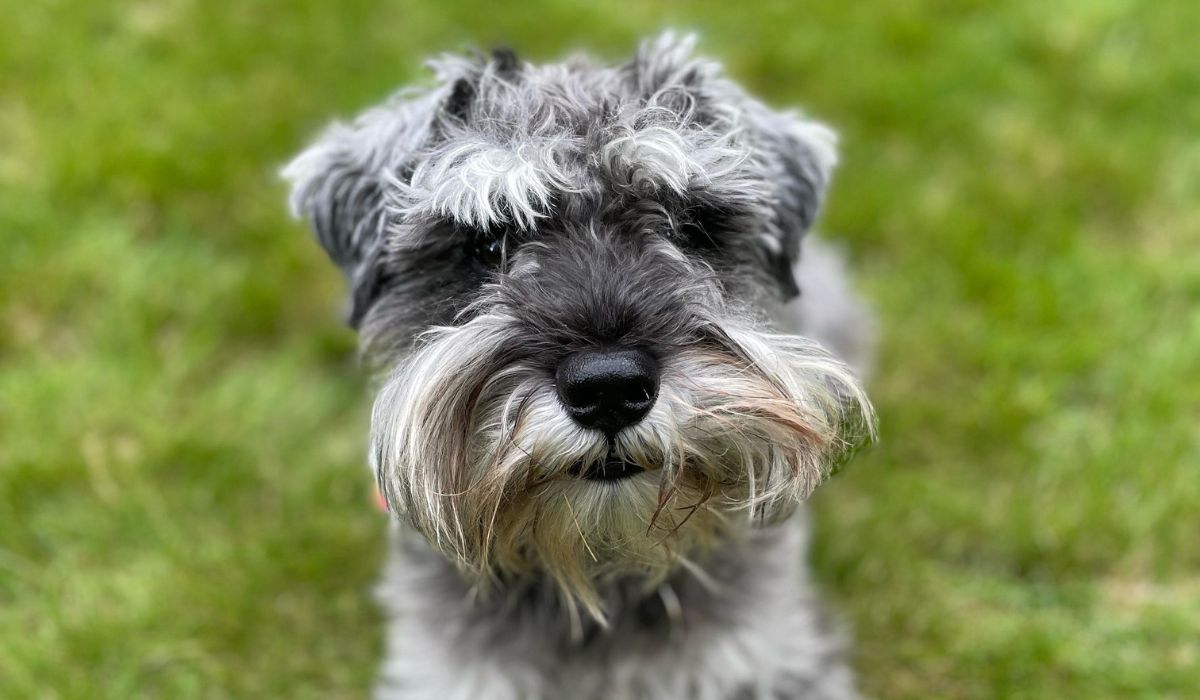
With so many options available on the market, choosing the right food for your miniature schnauzer can be overwhelming. Here are some tips to help you make an informed decision:
Read the Label
The first and most crucial step is to read the label of the dog food you’re considering. Look for high-quality ingredients and make sure that the food meets your dog’s specific nutritional needs.
Avoid Fillers and By-products
Fillers like corn, wheat, and soy have little to no nutritional value for dogs and can cause digestive issues. Avoid dog food that contains these ingredients. Similarly, by-products are low-quality protein sources that should be avoided.
Consider Your Dog’s Age and Size
As discussed earlier, different life stages and sizes require different nutritional needs. Make sure to choose food that is suitable for your miniature schnauzer’s age and size.
Consult with Your Veterinarian
If you’re still unsure about which food is best for your miniature schnauzer, consult with your veterinarian. They can provide recommendations based on your dog’s health and specific needs.
Conclusion
The key to keeping your miniature schnauzer happy and healthy is providing them with a well-balanced and nutritious diet. Make sure to include essential nutrients like protein, fat, carbohydrates, and fiber in their diet while also considering their life stage and any specific health issues they may have. By following this comprehensive guide, you can ensure that your little buddy is getting all the necessary nutrients to live a long and healthy life by your side.
